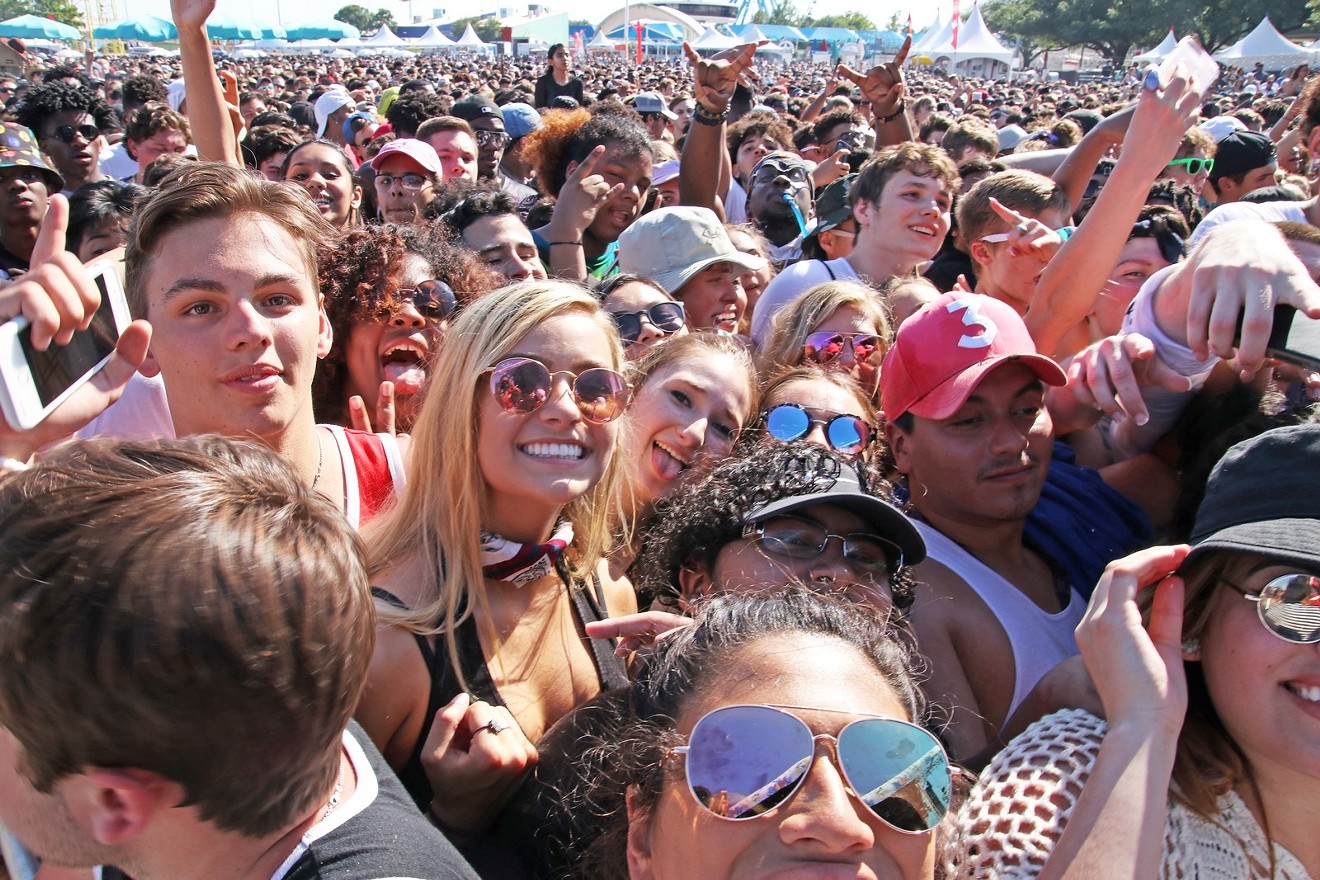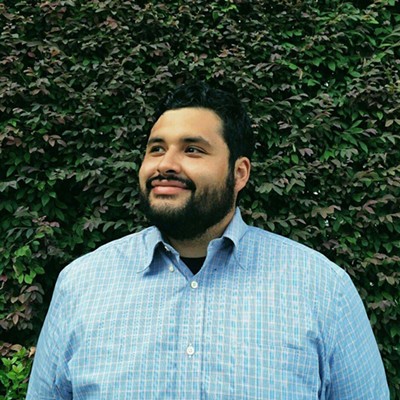They also made up half of the bill at the fifth annual hip-hop and EDM festival JMBLYA, which brought 25,000 people to Fair Park in May. The festival, presented by ScoreMore, takes place on consecutive days in Dallas and Austin.
JMBLYA, which got its start in 2013 at South Side Ballroom, has developed a reputation for booking premiere acts and buzzy up-and-comers. Tyler, The Creator; Future; G-Eazy; Post Malone; Steve Aoki; and Travis Scott are just a few names that have graced its lineups.
The 2018 JMBLYA — in Dallas on May 4 — is anticipated to be the biggest yet. For the first time, the festival is expanding to Houston. We spoke to ScoreMore’s Sascha Stone Guttfreud, who co-founded the company with Claire Bogle, about the festival’s growth and expansion and how it almost crashed and burned.
What are your thoughts on the culture that is building around JMBLYA?
It’s a dream come true, right? We had this idea of trying to build something different that we thought would resonate with hip-hop lovers throughout the state of Texas, and it just happened organically. It’s so cool. I went to this UT basketball game not too long ago, and there were these kids wearing JMBLYA merch, or I’ll wear something JMBLYA in the mall and kids recognize it. Kids just feel very connected to it, like it's their event.
We try to make it so all the festivals have their own distinct voice and persona. We try to treat each festival like it's their own person. For JMBLYA to live on its own the way it has is amazing. But I’d be lying if I said, “Aw yeah, we’re gonna start at South Side Ballroom and then five years later we’re gonna do 25,000 tickets at Fair Park.” We had no idea, no clue, but we’re just fortunate that Dallas is an incredible market and we love it. Dallas has been very good to us for a long time, even going back to doing Kendrick at Trees, y’know. It’s just been a great city and we love it.
"Now more than ever, kids can distinguish very quickly whether something is authentic or not." — Sascha Stone Guttfreud
tweet this
Is it true that the first edition in 2013 was a financial blow to ScoreMore and the company was almost sunk?
Yeah, it was horrible. We were faced with a decision. Do we cancel this thing or let it play? I called one of my mentors — Charles Attal, the owner at C3 — and he told me, 'You have to ask yourself a very honest question. Are you keeping this show out of ego, or are you keeping this show because you believe that you can grow a brand?' It was something I thought about and thought about, and we made a decision to play it out and invest in creating something, and we’re so grateful and fortunate that it rolled out the way that it has.
Why have ScoreMore and JMBLYA made Dallas their home?
I think it’s as simple as this: We view ourselves as curators and ambassadors when it comes to this culture. We feel we’re very proud of how we represent this culture. The fact is, the success of Dallas is just that Dallas is a great city with a ton of people who love hip-hop. It wasn’t any carefully calculated thing. The market really wanted it. The kids know it's real and JMBLYA belongs to them. If they buy tickets early, they save money because they believe in the lineup. Merch is a piece of it and it feels real. Now more than ever, kids can distinguish very quickly whether something is authentic or not.
That’s one of the most fascinating aspects about JMBLYA, that kids buy tickets early to save money without even seeing the lineup. How does it feel to have that kind of trust?
It’s amazing, and we try to reward those people. This 2018 JMBLYA lineup, we think, is our biggest ever, and it's our responsibility to remind those kids that by investing in that, they’re making the right decision. Because at the end of the day, if we put up a lineup that the kids don’t love, then they’re going to feel betrayed, and it’s our responsibility to take care of the people who take care of us.
In the past couple of years, the festival has grown to a 25,000-person event. ScoreMore continues to add amenities for fans, and you’ve announced even more for 2018. Why keep revamping the event if it's already working?
When you’re talking about a creating an event that has 25,000 people there, that’s a lot of responsibility, and you have to do a good job and be mindful of the fact that not only is it about the artists and the other things we do, but these people have to have a great time and they deserve access to all these things.
Kids shouldn’t have to buy water. We’re really big on free water stations; the bars can sell their own water, but for us, we always want everyone to be comfortable and enjoy themselves. This year, we’re scaling up the event and going with two stages instead of one. What that’s going to allow is that there are more acts, and it will be good for crowd flow. We want everyone to feel comfortable to grab a drink or use the restroom and not feel like they’re losing their spot. They can take a breather.
How many more acts will there be this year?
In 2017, we had 10 acts on the bill, and this year, we’ll have 12 total, which makes sense to have two stages.
JMBLYA also does a lot of work with the communities around the festival. Tell us more about that.
We’re doing a program right now with a high school in Sedona, Arizona, where I went, and we’re working with students and trying to teach them how to produce an event. I had a conversation with the principal, and he wanted to talk about some of the lyrical content of the music, and what I explained to him is just because you watch a horror film doesn’t mean you like murder or stand by it.
It’s really important to remember this music is art, and even though the lyrics might not make your mom and dad happy, it’s important to use that platform because this is what the kids love. Period. We have to use that platform and show students, yes, this music is fun, it’s art and appreciate it as that. We try to use our platform in positive ways.
We have programs where if you write your teacher a thank-you note, you get a free ticket or if you donate $20 to Austin Recovery, then we’ll give you a free ticket. In Dallas, we work with U Got This with our boy Christian Yazdanpanah in Dallas high schools.
Locally the district is near Fair Park, and we’re trying to give the kids a 360-degree perspective of how putting on an event looks and introduce them to the music business. A lot of kids see the artist on the stage and want to be that person, but what we’re showing them is that for every artist onstage, there are 50 people making that possible. I think it’s important for students to see both sides of it, and every single year, we’re going to give away more tickets.
Now that JMBLYA is coming up on its sixth year, what have been some of your favorite moments?
One of them was reading your article about earning the best festival in Dallas, for sure. Also, there are these two aerial photos, one of Dallas and one of Austin, and just to see what this thing has become is really beautiful. It’s beyond a dream come true. Without JMBLYA, we’d be a much smaller entity. JMBLYA has given us the opportunity to grow, put on more shows, and we’re launching more festivals this year and forever grateful for JMBLYA. I love seeing all the kids wearing the merch together. Everyone really rocks with the brand.
JMBLYA has a reputation for drawing out a lot of kids from the suburbs — often white kids. Some people make fun of it. What's your reaction?
Everything that we do is for everybody. Period. We want all of our events to be very clear that we want people who love music. We don’t care what they look like. We don’t care how old they are, male or female. We want people to always feel welcome at our events. As JMBLYA has grown, I think it’s become more and more diverse. I think it has become more diverse, and hopefully there is a mix of kids who live around Fair Park that can come out, but also kids from suburban areas being able to come to Fair Park. That’s the idea. We’re a diverse company; I’m a Spanish-speaking Jew. We’re a diverse mix of people, and we want our festival to represent the culture.
2018 is the final year of Vans Warped Tour. As JMBLYA expands to Houston, are you thinking about using that model and touring your lineup to multiple cities and states?
Vans Warped Tour is incredible. We’ve gone back and forth. You’ve seen Rolling Loud go on pop-up festivals all over the world and bring that brand to them. We thought for a long time, 'What is our path?" And what we’ve found is everybody should feel like our events belong to them. We want anybody who wants to come to our events to feel like they’re friends with that entity.
For us, it makes more sense to let JMBLYA be the hip-hop festival of Texas. Dallas, Houston, Austin. The idea for us is that if you live in Texas, JMBLYA belongs to you and it's your friend. It’s the same reason why with San Antonio, we didn’t do JMBLYA there. We created Mala Luna because it was important for San Antonio to have its own festival. So as we look and continue to add more markets throughout the country, it’s important that each market has their own festival and their own friend that belongs to them. JMBLYA belongs to Texas.
Is there anything else we should know about JMBLYA in 2018?
Lineup is coming soon. Let’s talk then.













